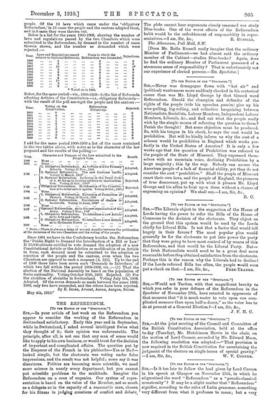THE REFERENDUM.
[To THII EDITOR OF Tire "SPECTATOR:9 Srn,—In your article of last week on the Referendum you appear to consider the working of the Referendum in Switzerland satisfactory. Early this year and in September, while in Switzerland, I asked several intelligent Swiss what they thought of it; their opinion was unfavourable. The principle, after all, is not one that any man of sense would like to apply to his own business, or would trust for the decision of important and complicated affairs. The question put by the Emperor of the French in his plebiscite—Yes or No ?— looked simple, but the electorate was voting under false impressions, and the result was not helpful ; some say it was disastrous. Politics are becoming more scientific, we need more science in nearly every department, but you cannot put scientific problems to the multitude. Imagine the Referendum on a crux of eugenics. Our system of repre- sentation is based on the value of the Member, not so much as a delegate as' in the capacity of a reasonable man, chosen for his fitness in judging Questions of conflict and debate. The plebs cannot hear arguments closely reasoned nor study Blue-books. One of the worst effects of the Referendum habit would be the enfeeblement of responsibility in repre-
sentatives.—I am, Sir, &c., R. RUSSELL. The Athenzum, Pall Mall, S.W.
[Does Mr. Rollo Russell really imagine that the ordinary Member of Parliament—we had almost said the ordinary member of the Cabinet—studies Blue-books ? Again, does he find the ordinary Member of Parliament possessed of a strenuous sense of responsibility ? That is unfortunately not our experience of elected persons.—En. Spectator.'










































































 Previous page
Previous page